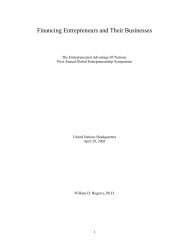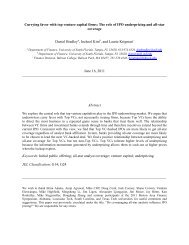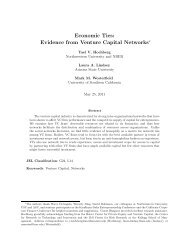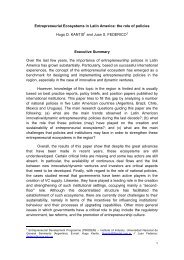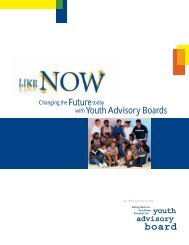Financing Child Care in the United States - Ewing Marion Kauffman ...
Financing Child Care in the United States - Ewing Marion Kauffman ...
Financing Child Care in the United States - Ewing Marion Kauffman ...
Create successful ePaper yourself
Turn your PDF publications into a flip-book with our unique Google optimized e-Paper software.
CONTACTS<br />
For <strong>in</strong>formation about preschool programs<br />
<strong>in</strong> New Jersey:<br />
Margretta Reid Fairwea<strong>the</strong>r<br />
Assistant Commissioner for Early <strong>Child</strong>hood Education<br />
Department of Education<br />
P.O. Box 500<br />
Trenton, NJ 08625<br />
Phone (609) 777 2074<br />
Fax (609) 341 2763<br />
Web<br />
http://www.state.nj.us/njded/genfo/toc.htm<br />
For <strong>in</strong>formation about <strong>the</strong> Abbott decisions<br />
and <strong>the</strong>ir impact:<br />
Cecilia Zalk<strong>in</strong>d<br />
Association for <strong>Child</strong>ren of New Jersey<br />
35 Halsey Street<br />
Newark, NJ 07102<br />
Phone (973) 643 3876<br />
Fax (973) 643 9153<br />
E–mail CZalk<strong>in</strong>d@ACNJ.org<br />
Web www.ACNJ.org<br />
David Sciarra<br />
Education Law Center<br />
155 Wash<strong>in</strong>gton Street, Suite 205<br />
Newark, New Jersey 07102<br />
Phone (973) 624 1815<br />
Fax (973) 624 7339<br />
Web<br />
www.edlawcenter.org<br />
Steven Barnett<br />
Center for Early Education<br />
Graduate School of Education, Rutgers University<br />
P. O. Box 5050<br />
New Brunswick, NJ 08903<br />
Phone (732) 932 7496 Ext. 235<br />
Fax (732) 932 1957<br />
E–mail wbarnet@rci.rutgers.edu<br />
PREKINDERGARTEN PROGRAM<br />
(TEXAS)<br />
DESCRIPTION<br />
Texas established a categorical, part–day, school–year<br />
prek<strong>in</strong>dergarten program targeted for at–risk<br />
4–year–olds and is <strong>the</strong> only state that requires school<br />
districts to provide a prek<strong>in</strong>dergarten program if at least<br />
15 eligible children reside <strong>in</strong> <strong>the</strong> district.<br />
WHEN ESTABLISHED<br />
Texas established its prek<strong>in</strong>dergarten program as part of<br />
an education reform package recommended to <strong>the</strong><br />
legislature by <strong>the</strong> Select Committee on Public Education,<br />
appo<strong>in</strong>ted by <strong>the</strong> governor <strong>in</strong> 1983. House Bill 72,<br />
considered <strong>in</strong> a special legislative session called by <strong>the</strong><br />
governor, was passed and signed <strong>in</strong>to law <strong>in</strong> July 1984,<br />
and <strong>the</strong> program was implemented <strong>in</strong> <strong>the</strong> 1985–86<br />
school year.<br />
ANNUAL AMOUNT<br />
In <strong>the</strong> 1998–99 school year, state education funds for<br />
prek<strong>in</strong>dergarten totaled $171.9 million, support<strong>in</strong>g 925<br />
districts serv<strong>in</strong>g 138,429 children. For <strong>the</strong> 1998–99<br />
school year, per pupil aid was $2,485. State aid per<br />
prek<strong>in</strong>dergartener is set at half this amount, or<br />
$1,242.50. Recent legislation appropriated $200 million<br />
for two years to fund <strong>the</strong> optional expansion of <strong>the</strong><br />
prek<strong>in</strong>dergarten program from a half–day to a full–day<br />
program. Priority for <strong>the</strong> fund<strong>in</strong>g is given to districts <strong>in</strong><br />
which <strong>the</strong> third–grade achievement scores fall below<br />
average.<br />
SERVICES FUNDED<br />
House Bill 72 authorizes any school district to provide<br />
prek<strong>in</strong>dergarten classes, but requires school districts<br />
that have more than 15 educationally disadvantaged<br />
4–year–olds with<strong>in</strong> <strong>the</strong> district to provide a program.<br />
The def<strong>in</strong>ition of “educational disadvantage” applies<br />
to children whose families are low–<strong>in</strong>come, unable to<br />
speak English or homeless.<br />
The prek<strong>in</strong>dergarten program can be operated only by<br />
school districts and with<strong>in</strong> public school facilities,<br />
although subcontract<strong>in</strong>g is permitted and coord<strong>in</strong>ation<br />
with o<strong>the</strong>r early childhood programs such as Head Start<br />
is encouraged. Prek<strong>in</strong>dergarten programs must meet at<br />
least three hours a day for <strong>the</strong> full school year and be<br />
taught by a certified teacher.<br />
HOW FUNDS DISTRIBUTED<br />
FOOTNOTE<br />
1<br />
Simmons, Tim (February 13, 1999). “Judge: Poor Have Right to<br />
Preschool.” Raleigh, NC: The News & Observer. (Pages 1B, 5B).<br />
For <strong>the</strong> first three years, a fixed allocation for<br />
prek<strong>in</strong>dergarten was a l<strong>in</strong>e item <strong>in</strong> <strong>the</strong> state education<br />
budget. The funds were distributed among participat<strong>in</strong>g<br />
districts based on a fund<strong>in</strong>g formula that favored poorer<br />
districts. The orig<strong>in</strong>al law required that a local district<br />
provide a cash match of up to one–third of <strong>the</strong> cost of<br />
<strong>the</strong> prek<strong>in</strong>dergarten program.<br />
88






